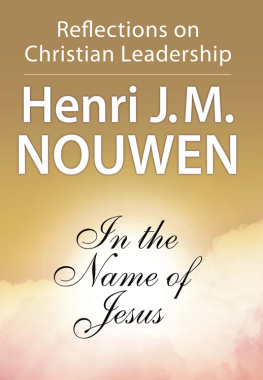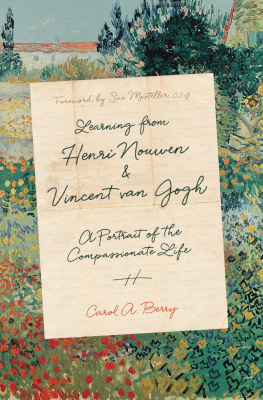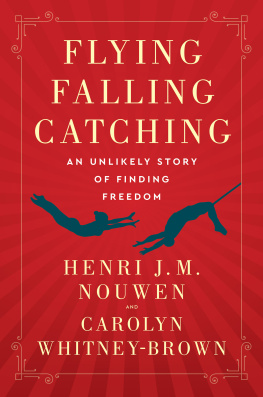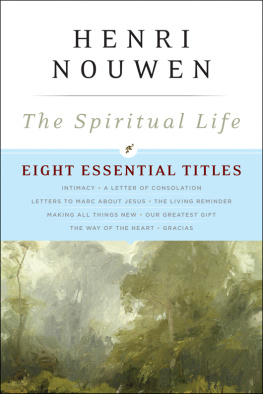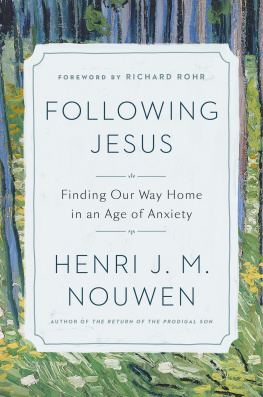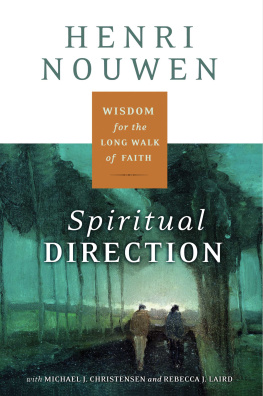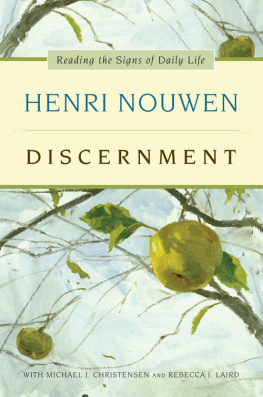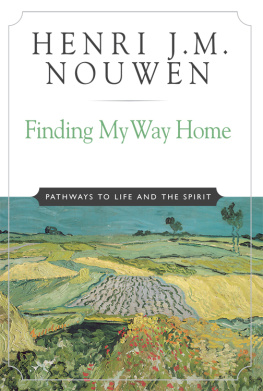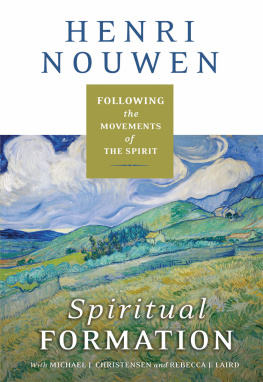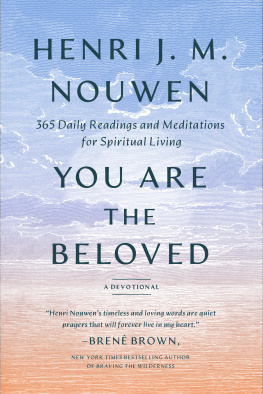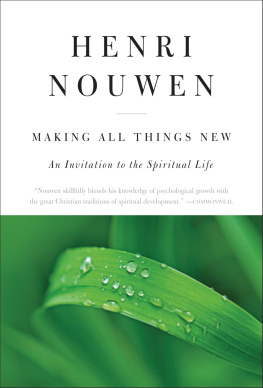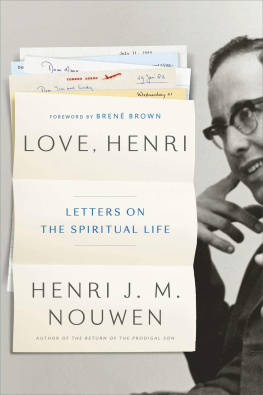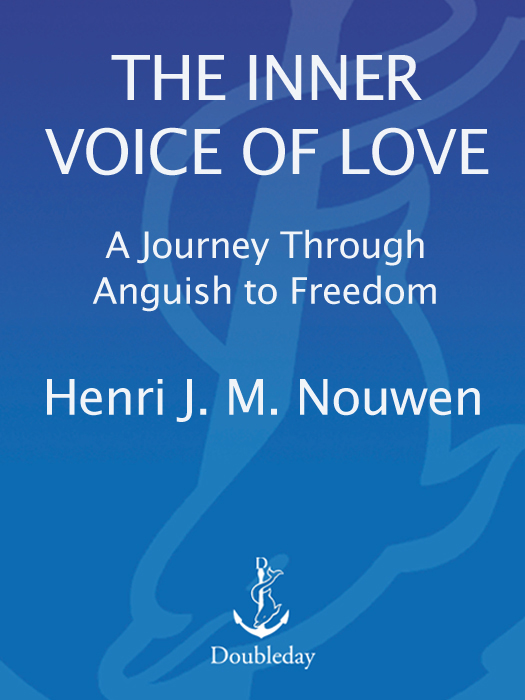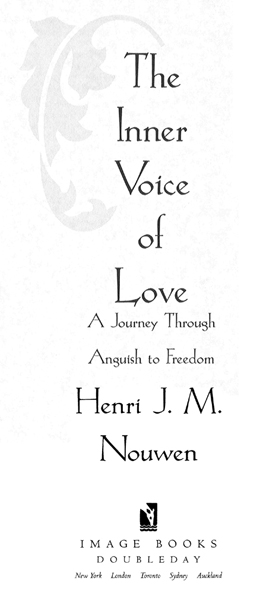A N I MAGE B ook
published by doubleday
a division of Random House, Inc.
1540 Broadway, New York, New York 10036
I MAGE , D OUBLEDAY , and the portrayal of a deer drinking
from a stream are trademarks of Doubleday, a division of
Random House, Inc.
First Image Books edition published February 1998 by special
arrangement with Doubleday.
The Library of Congress has cataloged the hardcover edition of
this book as follows:
Nouwen, Henri J. M.
The inner voice of love: a journey through
anguish to freedom / Henri J. M. Nouwen.
1st ed.
p. cm.
1. Nouwen, Henri J. M.Diaries. 2. Catholic
ChurchClergyDiaries. 3. Distress
(Psychology) 4. AnxietyReligious
aspectsChristianity.
5. Spiritual lifeChristianity.
I. Title.
BX4705.N87A3 1996
282.092dc20 96-8162
eISBN: 978-0-307-76877-3
Copyright 1996 by The Estate of Henri J. M. Nouwen
All Rights Reserved
v3.1
To Wendy and Jay Greer
Contents
Acknowledgments
Connie Ellis was the first person who typed the manuscript of this book, and Conrad Wieczorek was the first person who edited it. Both have since died. I remember them with much affection and gratitude.
Kathy Christie, my secretary, and Susan Brown, my editor, have done a great deal to make this text ready for publication. I thank them both for their caring and competent work.
A special word of gratitude goes to my friend Wendy Greer, who encouraged me during the past three years to overcome my hesitation to publish this book and offered many good ideas for changes and corrections. The generous financial support of Wendy and her husband, Jay, and their many friends has been a great source of inspiration to me.
I also want to thank Alice Allen and Ed Goebels for helping me with all the contractual work necessary for this publication.
Finally, many thanks to Bill Barry and Trace Murphy at Doubleday for their visits to me at the Daybreak community, for their continued interest in my writing, especially in this book, and for their flexibility and patience during the preparation of the final manuscript.
Introduction
This book is my secret journal. It was written during the most difficult period of my life, from December 1987 to June 1988. That was a time of extreme anguish, during which I wondered whether I would be able to hold on to my life. Everything came crashing downmy self-esteem, my energy to live and work, my sense of being loved, my hope for healing, my trust in God everything. Here I was, a writer about the spiritual life, known as someone who loves God and gives hope to people, flat on the ground and in total darkness.
What had happened? I had come face to face with my own nothingness. It was as if all that had given my life meaning was pulled away and I could see nothing in front of me but a bottomless abyss.
The strange thing was that this happened shortly after I had found my true home. After many years of life in universities, where I never felt fully at home, I had become a member of LArche, a community of men and women with mental disabilities. I had been received with open arms, given all the attention and affection I could ever hope for, and offered a safe and loving place to grow spiritually as well as emotionally. Everything seemed ideal. But precisely at that time I fell apartas if I needed a safe place to hit bottom!
Just when all those around me were assuring me they loved me, cared for me, appreciated me, yes, even admired me, I experienced myself as a useless, unloved, and despicable person. Just when people were putting their arms around me, I saw the endless depth of my human misery and felt that there was nothing worth living for. Just when I had found a home, I felt absolutely homeless. Just when I was being praised for my spiritual insights, I felt devoid of faith. Just when people were thanking me for bringing them closer to God, I felt that God had abandoned me. It was as if the house I had finally found had no floors. The anguish completely paralyzed me. I could no longer sleep. I cried uncontrollably for hours. I could not be reached by consoling words or arguments. I no longer had any interest in other peoples problems. I lost all appetite for food and could not appreciate the beauty of music, art, or even nature. All had become darkness. Within me there was one long scream coming from a place I didnt know existed, a place full of demons.
All of this was triggered by the sudden interruption of a friendship. Going to LArche and living with very vulnerable people, I had gradually let go of many of my inner guards and opened my heart more fully to others. Among my many friends, one had been able to touch me in a way I had never been touched before. Our friendship encouraged me to allow myself to be loved and cared for with greater trust and confidence. It was a totally new experience for me, and it brought immense joy and peace. It seemed as if a door of my interior life had been opened, a door that had remained locked during my youth and most of my adult life.
But this deeply satisfying friendship became the road to my anguish, because soon I discovered that the enormous space that had been opened for me could not be filled by the one who had opened it. I became possessive, needy, and dependent, and when the friendship finally had to be interrupted, I fell apart. I felt abandoned, rejected, and betrayed. Indeed, the extremes touched each other.
Intellectually I knew that no human friendship could fulfill the deepest longing of my heart. I knew that only God could give me what I desired. I knew that I had been set on a road where nobody could walk with me but Jesus. But all this knowledge didnt help me in my pain.
I realized quite soon that it would be impossible to survive this mentally and spiritually debilitating anguish without leaving my community and surrendering myself to people who would be able to lead me to a new freedom. Through a unique grace, I found the place and the people to give me the psychological and spiritual attention I needed. During the six months that followed, I lived through an agony that seemed never to end. But the two guides who were given to me did not leave me alone and kept gently moving me from one day to the next, holding on to me as parents hold a wounded child.
To my surprise, I never lost the ability to write. In fact, writing became part of my struggle for survival. It gave me the little distance from myself that I needed to keep from drowning in my despair. Nearly every day, usually immediately after meeting with my guides, I wrote a spiritual imperativea command to myself that had emerged from our session. These imperatives were directed to my own heart. They were not meant for anyone but myself.
In the first weeks it seemed as if my anguish only got worse. Very old places of pain that had been hidden to me were opened up, and fearful experiences from my early years were brought to consciousness. The interruption of friendship forced me to enter the basement of my soul and look directly at what was hidden there, to choose, in the face of it all, not death but life. Thanks to my attentive and caring guides, I was able day by day to take very small steps toward life. I could easily have become bitter, resentful, depressed, and suicidal. That this did not happen was the result of the struggle expressed in this book.
When I returned to my community, not without great apprehension, I reread all I had written during the time of my exile. It seemed so intense and raw that I could hardly imagine it would speak to anyone but me. Even though Bill Barry, a friend and a publisher at Doubleday, felt strongly that my most personal struggle could be of great help to many people, I was too close to it to give it away. Instead I started work on a book about Rembrandts painting


